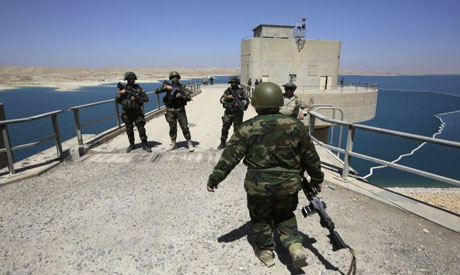
Peshmerga fighters stand guard at Mosul Dam in northern Iraq, near the site of an alleged Isis chemical attack against Kurdish forces, August 21, 2014. (Photo: Reuters)
A team of Iraqi government experts will go to Iraq's Kurdish autonomous region this week to investigate allegations that Islamic State (IS) insurgents have used chemical weapons against Kurdish forces, diplomats said on Monday.
Chemical agents were not known to have been used in fighting in Iraq since Saddam Hussein's fall in 2003. If the allegations are confirmed, it would mean that Islamist militants have gained a new weapon in a conflict that has destabilised the region.
Three chemical attacks against Kurdish Peshmerga forces, all in mortar rounds, have been reported by Kurdistan Regional Government officials in northern Iraq this year.
Kurdish officials cited laboratory tests as having shown positive for the chemical agent chlorine.
Diplomats said national Iraqi government officials had launched an inquiry to collect their own samples and determine the accuracy of claims of mustard gas use in the course of Islamic State's capture of large swathes of territory in the north of the country since mid-2014.
"They (Iraqi experts) are going to the Kurdish region this week to determine whether chemical weapons were used or not," a diplomat briefed about the investigation told Reuters on Monday. Three incidents were to be investigated, the diplomat added.
The Organisation for the Prohibition of Chemical Weapons (OPCW), the global watchdog based in The Hague, will be briefed and might soon follow with its own investigative mission, according to the diplomats.
The OPCW, of which Iraq is a member, has expressed concern about the Kurdish allegations and offered assistance.
Chlorine's use as a weapon is prohibited under the 1997 Chemical Weapons Convention. If inhaled, chlorine gas turns to hydrochloric acid in the lungs and can kill by burning lungs and drowning victims in the resulting bodily fluids.
Known chemical weapons stockpiles in Iraq and Syria have been destroyed under the supervision of the OPCW.
There is an ongoing OPCW mission in Syria to destroy chemical weapons storage and production facilities and pin down whether its poison gas programme has been completely eliminated, as President Bashar al-Assad's government says.
To avert U.S. military intervention over reports of poison gas use in Syria's civil war, the Assad government last year handed over 1,300 tonnes of chemical weapons, including sarin and mustard gas precursors, for destruction abroad.
Short link: